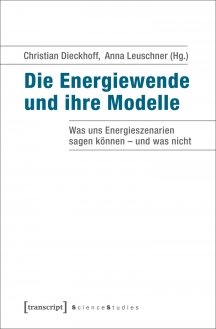New publication: Die Energiewende und ihre Modelle (The energy transition and its models)
Our knowledge of the complex energy system and its future development is very limited. To be still able to get some guidance, energy scenarios are published every year in large numbers and great heterogeneity. Especially energy policy is guided by the findings that were gained in this way. But on which scientific foundation are these scenarios actually based? The volume "Die Energiewende und ihre Modelle. Was uns Energieszenarien sagen können – und was nicht." ("The energy transition and its models. What energy scenarios can tell us – and what they cannot."), which was edited by Christian Dieckhoff (ITAS) and Anna Leuschner (Leibniz Universität Hannover), addresses this question.
The publication examines the main difficulties and possibilities how information that is relevant for energy policy can be achieved by socio-economic modelling. Their aim is to contribute to an informed societal discourse on the transformation of the energy system. In addition, the authors want to provide a new impetus for the philosophical debate on models and scenarios as well as the role of scientists in democratic societies.
All authors who contributed to this volume were members of the scientific-philosophical research group "Limits and Objectivity of Scientific Foreknowledge: The Case of Energy Outlooks" (LOBSTER) led by Gregor Betz which researched the conditions of reliable scientific policy advice from 2012 until 2015. (12.12.2016)
Bibliographic data
Dieckhoff, Christian; Leuschner, Anna (Hg.)
Die Energiewende und ihre Modelle. Was uns Energieszenarien sagen können – und was nicht. Bielfeld: transcript 2016
Publisher info


